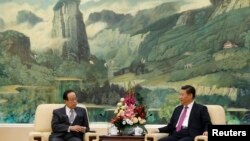Japan says discussions are underway for a meeting to take place between Japanese Prime Minister Shinzo Abe and Chinese President Xi Jinping after the two countries agreed to ramp up dialogue.
Japanese foreign ministry spokesman Ken Okaniwa said both governments are discussing the possibly the two leaders could meet at next week's Asia-Pacific Cooperation summit in Beijing. He said they also are working to arrange a meeting of foreign ministers.
"Both governments are trying to arrange a Foreign Ministers meeting. As for the meeting between Prime Minister Abe and President Xi Jinping, it is not yet planned," said Okaniwa. "But there is a concrete -- I guess we are trying to arrange concretely, with a view to arranging -- we are discussing with a view to arranging such a meeting, but it is not yet decided."
Thawing ties
The comments came hours after China and Japan agreed to ramp up dialogue, a move that could represent a breakthrough in long frosty ties between the world's second and third largest economies.
In a joint statement released Friday the two sides agreed to "gradually resume political, diplomatic and security dialogue" and "make efforts to build political mutual trust."
The statement did not specify when or at what level the dialogue would occur.
The two sides also acknowledged having "different opinions" on a territorial dispute in the East China Sea, and agreed to "establish crisis management mechanisms" to help lower tensions.
The deal was reached during a meeting in Beijing between Chinese State Councilor Yang Jiechi and Japanese National Security Adviser Shotaro Yachi.
An adviser to Prime Minister Abe, Tomohiko Taniguchi, told VOA such a meeting is "almost certain" to occur following the Friday agreement, which he said could signal warmer ties.
"I think that is as much as one can make of it and it has gotten likelier still that on the sideline of the APEC meetings next week, a Xi-Abe handshaking opportunity -- exchanging smile opportunity, mainly an extended photo-op -- should take place," said Taniguchi.
"Whether this could lead to more substantial dialogue between the two governments and between the two heads of state, this is still an open-ended question. But as far as the meeting, no matter what sort of meeting that would be, between Xi and Abe is concerned, I think it is almost certain that it will take place," said Taniguchi.
Behind the scenes
China and Japan have had only low-level diplomatic interaction in recent months, though there have been signs that both sides are open to gradually improving relations.
Japan has for months been pushing for a face-to-face meeting between Prime Minister Abe and President Xi. Such a meeting has not taken place since the two leaders took office.
One of the longstanding obstacles to bilateral ties was Japan's refusal to even acknowledge there is a dispute over the islands, known in Japan as Senkaku and in China as Diaoyu.
It was not immediately clear whether Japan made a concession on the issue in order to secure Friday's agreement. Taniguchi said judging by the wording of Chinese state media reports, it is not likely Japan made any such compromise.
But the head of University of Sydney's China Studies Center, Kerry Brown, told VOA the agreement nonetheless represents a "quite important step forward" in the island dispute.
"I think that it is probably not a massive concession in the sense that Japan is trying to say, 'Okay, we are going to give some ground to China.' They are probably trying to hammer out a way in which they must ultimately deal with these issues without dealing with the sovereignty issue, which at the moment is probably unsolvable," said Brown.
Brown, a former British diplomat in Beijing, said both China and Japan seem to have realized the current state of relations is unsustainable. He said the timing of Friday's deal makes it likely that Xi and Abe will meet next week.
"If it does not lead to [a meeting], there will be a sense of disappointment... Otherwise, it sort of just dangles there and what is the political point of it? I think it makes me assume they will then actually meet bilaterally and try and say what their vision of the relationship is at the moment," said Brown.










